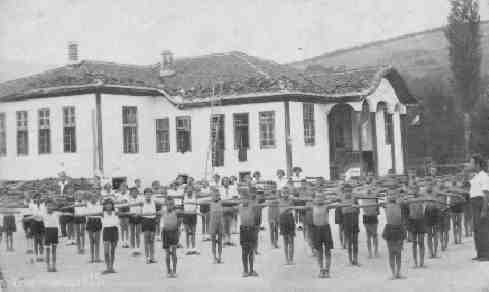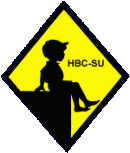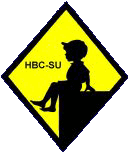
Figure 1.--Bulgarian boys and girls are doing calesthetics in fron of their school, probably in the 1920s and 30s. All of the boys appear to be wearing uniform short pants. |

|
Bulgarian history is more complicated than that of several better known European countries. Some basic knowledge of Bulgaria is need to be able to understand when Bulgarian schools were first established and how they operated as well as school uniform trends which are often affected by political trends. Bulgarian was part of the Roman province of Thrace and Upper Moesia. A Slavic tribe occupied the area in the 3rd century. The Utiguri, a Bulgar Horde (related to the Huns and Tartars) established a kingdom. The Bulgars, a nomadic people, settled on the land and adopted the language and customs of the Slavs who they inter-married with. They are the descendents of modern Bulgarians. The Bulgars were christianized in the 9th century by missiomaries from Byzantium. The Bulgarian Kingdom was seized by the Ottoman Turks who ruled for more than 5 centuries. I am mot sure to what extent the Turks permitted the establishment of schools or instruction in the Bulgariann language. The Bulgarians revolted unsuccessfully against the Turks in 1876. The Turks brutally supressed the revolt, masacering some 15,000 civilians. The Turkish attrocities horrified Europe. Russia seeking to push toward the Mediterranean, intervened. The resullt of the Turkish-Bulgarian War was that Turkey lost a portion of Bulgaria which became an independent principlaity. The rest (Eastern Rumelia) was made an autonomous Turkish principality. Bulgaria declared independence in 1908, taking advantage of the Young Turk Revolution in Turkey. War were fought with Serbia, Turkey, Greece, and Romania. Borders were redrawn and territories list and gained, especially in the Balkan Wars preceeding the First World War. Bulgaria enters World War on the side of the CentralmPowes in 1915. As a result of the War, Bulgaria lost considerable territory. The Treaty ending the War gave rise to a right-wing Fascist movement. The Agrarian Party Goverment that came to power in 1919 worked hard to improve the country's economy and lot of the country's large rural population, despite the harshness of the Neuilly Treaty (1919). The Goverment sought to curb extreme right-wing groupd and after a history of Balkan wars, friendly relations with neighboring countries. The Bulgarians were swept into the NAZI orbit following the early German sucesses in Poland and France. Hitler forced the Romanians to cede territory. Bulgaria joined the Axis in 1941 and agreed to the entry of German forces. Despite the protests of the Western Allies, the Russians manipulated elections in 1945. A rigged plebecite in 1946 set up a People's Republic and deposed King Simeon. A severe era of Stalinist repression followed.
Bulgarian was part of the Roman province of Thrace and Upper Moesia. A Slavic tribe occupied the area in the 3rd century. The Utiguri, a Bulgar Horde (related to the Huns and Tartars) established a kingdom. The Bulgars, a nomadic people, settled on the land and adopted the language and customs of the Slavs whonthey inter-mairred with. They are the descendents of modern Bulgarians. The Bulgars were christianized in the 9th century by missiomaries from Byzantium. The Bulgarian Kingdom was seized by the Ottoman Turks who ruled for more than 5 centuries. I am mot sure to what extent the Turks permitted the establishment of schools or instruction in the Bulgariann language.
The Bulgarians revolted unsuccessfully against the Turks in 1876. The Turks brutally supressed the revolt, masacering some 15,000 civilians. The Turkish attrocities horrified Europe. Russia seeking to push toward the Mediterranean, intervened. The resullt of the Turkish-Bulgarian War was that Turkey lost a portion of Bulgaria which became an independent principlaity. The rest (Eastern Rumelia) was made an autonomous Turkish principality. The first Prince of Bulgaria, A Geerman, was elected in 1879. Bulgarian affairs gets murky, the Russians pull out and a war was fought with Surbia. A new German king is chosen 1887.
Bulgaria declared independence in 1908, taking advantage of the Young Turk Revolution in Turkey. War were fought with Serbia, Turkey, Greece, and Romania. Borders were redrawn and territories list and gained, especially in the Balkan Wars preceeding the First World War. Bulgaria enters World War on the side of the CentralmPowes in 1915. As a result of the War, Bulgaria lost considerable territory. The Treaty ending the War gave rise to a right-wing Fascist movement.
The Agrarian Party Goverment that came to power in 1919 worked hard to improve the country's economy and lot of the country's large rural population, despite the harshness of the Neuilly Treaty (1919). The Goverment sought to curb extreme right-wing groupd and after a history of Balkan wars, friendly relations with neighboring countries. An attempt to curtail the power of the monarchy in 1923 resulted in a coup d'etat and the assasination of the Agrarian Prime Minister. Internal dissension followed. The Communists, Agrarians, and Liberals were excluded from a Government of national unity. A war with Greece in 1925 was mediated by the Laegue of Nations. King Borris assumed dictatorial powers in 1935.
The Bulgarians were swept into the NAZI orbit following the early German sucesses in Poland and France. Hitler forced the Romanians to cede territory. Bulgaria joined the Axis in 1941 and agreed to the entry of German forcesd. The Bulgarians assisted the Gemans in operations against Yugoslavia and Greece and occupied territories of those countries. Bulgarian signed the Anti-Comitetrn Pact and after Pear Harbor declared war on the United States and Britain. They did not declare war on the Russians despite intense pressure from Hitler. They also did not deliver up their Jees to the SS, one of the few European countries to protect them. (Denmark and Spain were the only other ones.) King Borris was assasinated in 1943 after returning home from a meeting with Hitler who intensified demands for the Bulgarians to enter the War. The King was suceeded by his 6-year old son Simeon II under a pro-NAZI regency. The Russians massed along the border and Bulgaria in 1994 decalred War on Germany and adsked for an armistace. A Goverment friendly to the Russians was immediately installed.
Despite the protests of the Western Allies, the Russians manipulated elections in 1945. A rigged plebecite in 1946 set up a People's Republic and deposed King Simeon. A severe era of Stalinist repression followed.
Related Bulgarian Pages in the Boys' Historical Web Site
[Return to the Main Bulgarian school page]
[Main Bulgarian country page]
[Bulgarian choir]
[Bulgarian royalty]
[Bulgarian scouts]
Related Style Pages in the Boys' Historical Web Site
[Long pants suits]
[Knicker suits]
[Short pants suits]
[Socks]
[Eton suits]
[Jacket and trousers]
[Blazer]
[School sandals]
[School smocks]
[Sailor suits]
[Pinafores]
[Long stockings]
Navigate the Boys' Historical Clothing Web Page
[Return to the Main school uniform country page]
[About Us]
[Activities]
[Chronology]
[Clothing styles]
[Countries]
[Debate]
[Economics]
[Garment]
[Gender]
[Hair]
[History]
[Home trends]
[Literary characters]
[School types]
[Significance]
[Transport and travel
[Uniform regulations]
[Year level]
[Other topics]
[Images]
[Links]
[Registration]
[Tools]
[Return to the Historic Boys' School Home]
